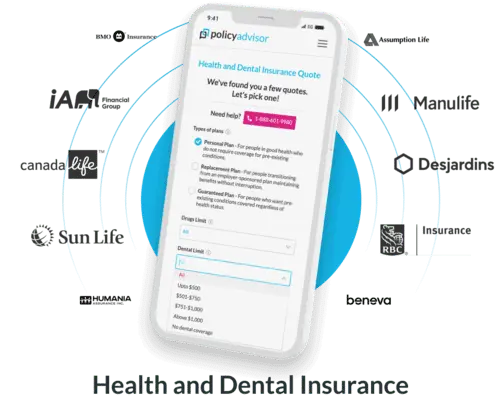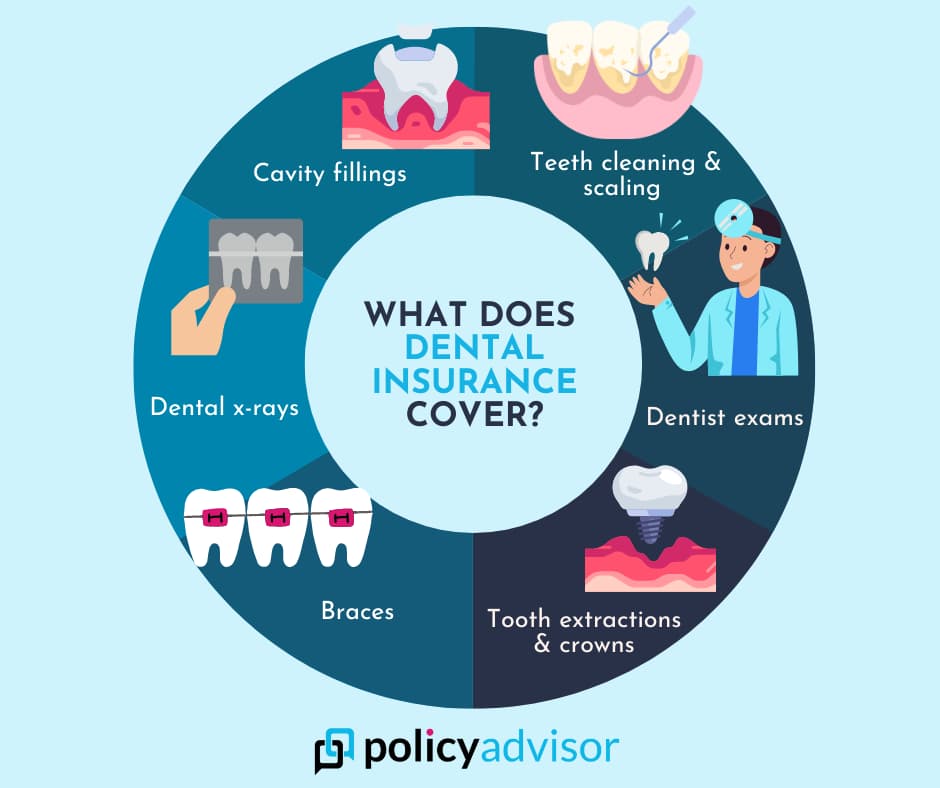- Dental services are usually included in comprensive health plans
- Basic health plans may not include dental care, but there may be an option to add it to the plan
- The cost and coverage of dental insurance can vary as a part of your health insurance package, with prices ranging from $80 - $200 per month
- Dental insurance covers teeth cleanings, dentist exams, x-rays, scaling, oral surgeries, teeth extractions, and other oral restorative treatments
Got a toothache that won’t go away? Do you have dental insurance?
If not, you’re not alone. Many people neglect their dental health due to the high cost of dental care. However, dental insurance can help you maintain a healthy smile without breaking the bank.
If you’re looking for dental insurance, it’s important to understand what your options are and how to choose the best plan for your needs. With a little bit of research and some careful consideration, you can find a dental insurance plan that provides the coverage you need at a price you can afford. In this article, we’ll guide you through the process of getting dental insurance and help you make an informed decision.
What is dental insurance?
Dental insurance is a type of personal health insurance that helps you pay for the cost of dental care. Individuals pay a monthly premium to an insurance provider, who then covers some or all of the cost of dental procedures and treatments.
While the specifics of dental insurance coverage can vary depending on the plan and provider, the overall goal is to help individuals access the dental care they need to maintain good oral health and prevent serious dental problems from developing.
Is dental insurance the same as health insurance?
Most health insurance plans offer some sort of dental insurance as a part of the benefits package—this is the most cost-effective way to get dental insurance (more on that below). However, it can be purchased separately as well.
What does dental insurance cover?
Dental insurance is an essential product for those who want to maintain good oral health and prevent any future dental problems. Services that are covered by dental insurance include preventative care, oral health issue treatments, and restorative services.
Dental insurance may cover:
- Preventative dental care
- Teeth cleaning
- Dental exams
- Cavity fillings
- Periodontal services
- Scaling
- Root planing
- Root canals
- Gum grafting
- Laser treatments
- Dental implants
- Tooth extractions
- Gingivectomy or crown lengthening
- Pocket reductions
- Oral surgeries*
- Apicoectomies (removing part of the jawbone)
- Jaw realignment
- Pulpectomies & pulpotomies
- Orthodontics
- Braces
- Headgear
- Removable appliances
- Retainers
*Specialist fees may exceed standard dental coverage. Always check your policy documents for full coverage details.
Is dental care free in Canada?
No, dental care is not free in Canada under the universal healthcare system. Most dental services, including check-ups, cleanings, and treatments, must be paid for privately or covered through private insurance plans.
Some provincial programs offer limited dental coverage for children, low-income families, and seniors. Employers often provide dental benefits through group insurance, and individuals can also purchase private plans to manage dental care costs.
Does dental insurance cover orthodontics and cosmetic dentistry?
Dental insurance typically covers orthodontics for medically necessary treatments, especially for children, but coverage for adults is often limited.
Orthodontic benefits vary, with some plans offering partial coverage for braces or aligners, but cosmetic procedures like teeth whitening, veneers, and bonding are rarely covered, as they are considered elective.
Higher-tier plans may include limited orthodontic benefits, but cosmetic dentistry usually requires out-of-pocket payment. Reviewing a policy’s details is essential to understand specific coverage limits for these services.
How much does dental insurance cost?
Usually, insurance companies package dental services into their overall health insurance plans. You can expect to pay anywhere from $80 – $200/month for health and dental insurance—but it really depends on your plan and your health.
Dental insurance coverage types and prices
| Coverage features | Basic health plan | Standard health plan | Enhanced health plan |
| Dental care | 70% of the first $575 (up to $400 every year) | 80% of the first $400 and 50% of the next $860 (up to $750 every year) | 100% of the first $500 and 60% of the next $700 (up to $920 every year) |
| Vision care | $150 every 2 years | $250 every 2 years | $250 every 2 years |
| Prescription drugs | 70% of the first $750 (up to $525 every year) | 70% of the first $750 and 90% of the next $4,972 (up to $5,000 every year) | 90% of the first $2,222 and 100% of the next $8,000 (up to $10,000 every year) |
| Travel insurance | $5 million in emergency health coverage for the first 9 days of each trip | $5 million in emergency health coverage for the first 9 days of each trip | $5 million in emergency health coverage for the first 9 days of each trip |
| Price | $97/month | $111/month | $171/month |
Are braces free in Canada?
No, braces are not free in Canada. Orthodontic treatments like braces are not covered by the public healthcare system, as they are considered non-essential. The cost must be paid out-of-pocket or through private dental insurance, which may partially cover orthodontic expenses.
Some provincial programs offer limited assistance for children from low-income families. Employers often include orthodontic coverage in group benefits, but individual insurance plans can also help manage costs.
Can you get dental insurance without health insurance?
The simple answer is “yes.” If you are looking strictly for dental coverage to cover your oral health costs, some insurance companies provide “stand-alone dental plans.” Although, the plans are usually not truly stand-alone. Most come with some sort of basic health insurance that’s added on to the full dental coverage.
We work with Canada’s top health and dental insurance providers. Here are some that have basic health care plans with dental insurance add-ons or extras.
How to get government dental insurance in Canada?
Canada has a universal dental care plan in place for eligible uninsured families with an annual income of less than $90,000 and with children under 12 years old. This plan was introduced in 2022 and provides annual payments of up to $650 per child for families.
Are dental emergencies covered by government health care?
This depends on what the emergency is. If the surgery is deemed medically necessary, then it may be covered by provincial health care or your medical coverage.
For example, if you’ve broken part of your jaw and it needs repair, it may be covered by universal health care. But if your emergency is for cosmetic reasons, like if you’ve knocked a tooth out and need it replaced, that won’t be covered.
What do I need to know before I buy dental insurance?
Before buying dental insurance, it’s important to know what your overall insurance needs are. As said above, dental insurance is usually included in health insurance packages, so it usually makes the most sense to buy the combo plan together. However, everyone’s insurance needs are unique.
If you have existing coverage through your employer, you probably will not need separate dental coverage. However, your employer plan could only cover medical insurance without any dental coverage or your insurance need may surpass that of your employer’s plan. Like all insurance, the best plan is the one that fits your specific needs.
Speak to one of our advisors today to find out the best plan for you and your family’s needs.
Frequently asked questions
Can you insure dentures or false teeth?
The cost of a dental appliance or prosthetic itself is usually covered under your dental insurance. However, if you have a particularly expensive set of dentures, false teeth, or other medical equipment, you may be able to cover that through your personal home insurance up to a specified limit.
For example, some home insurance providers have additional coverage for hearing aids, motorized mobility devices, and more.
How much does it cost to clean teeth?
The cost of teeth cleaning and scaling depends on your province. Some provinces have a “fair guideline” that dentists may have to adhere to for general dental services. For example, in Alberta, the guidelines state that polishing should be around $69, scaling should be $77, and a fluoride treatment should be $33, all of which are included in standard teeth cleaning.
Moreover, the approximate cost for just a cleaning may be around $180, depending on your province (not including the dentist consultation cost—just having the dentist examine your teeth will cost extra).
What is the most common type of dental insurance?
Many people have dental insurance provided through their employer benefits plan. For those that do not, they may opt for a basic plan as they are the least expensive.
Basic plans cover preventative care like teeth cleaning. Standard plans include orthodontics or restorative care like braces or teeth replacement.
What if I can’t afford dental insurance?
If you cannot afford dental insurance, you may be eligible for the Canada Dental Benefit. This is a taxpayer-funded program for families that earn less than $90,000/year and whose children are under 12.
Each province also may have dental care coverage available if you are a senior or are a family that needs income assistance.Visit the Government of Canada’s website or contact them to find out if you’re eligible.
Is there a waiting period for dental insurance?
Some plans may have a waiting period for dental insurance. This is usually the case with basic or low-cost plans. Having a waiting period with dental insurance means that you can’t claim anything once the policy comes into effect until the waiting period is over.
This is to prevent people from signing up for dental insurance when they already have pre-existing dental issues and then canceling the policy as soon as the treatment is done and paid for by insurance. Plans vary between 30-90 day waiting periods to no waiting at all.
What is a dental insurance predetermination?
An insurance predetermination is when your dental care provider requests a quote from your insurance provider to confirm which services and treatments will be covered by your plan. They will do this before the services are performed, to make sure that either the insurance fully covers it or that you can handle any remaining out-of-pocket expenses.
Do seniors get free dental coverage?
In some provinces, seniors with low or moderate incomes get financial assistance with basic dental care. However, that may not be the case in every province. By the end of 2023, the federal government is hoping to expand the Canada Dental Benefit to all individuals who are 18-years-old and under, seniors, and people living with disabilities.
Maintaining good oral health is an important part of being healthy overall, but it can be expensive. Dental insurance is a cost-effective way to cover dental treatment bills. Dental insurance can cover preventative care, dental exams, treatments, oral surgeries, restorative services, and more. You can access dental coverage through your general health insurance package.


 1-888-601-9980
1-888-601-9980




